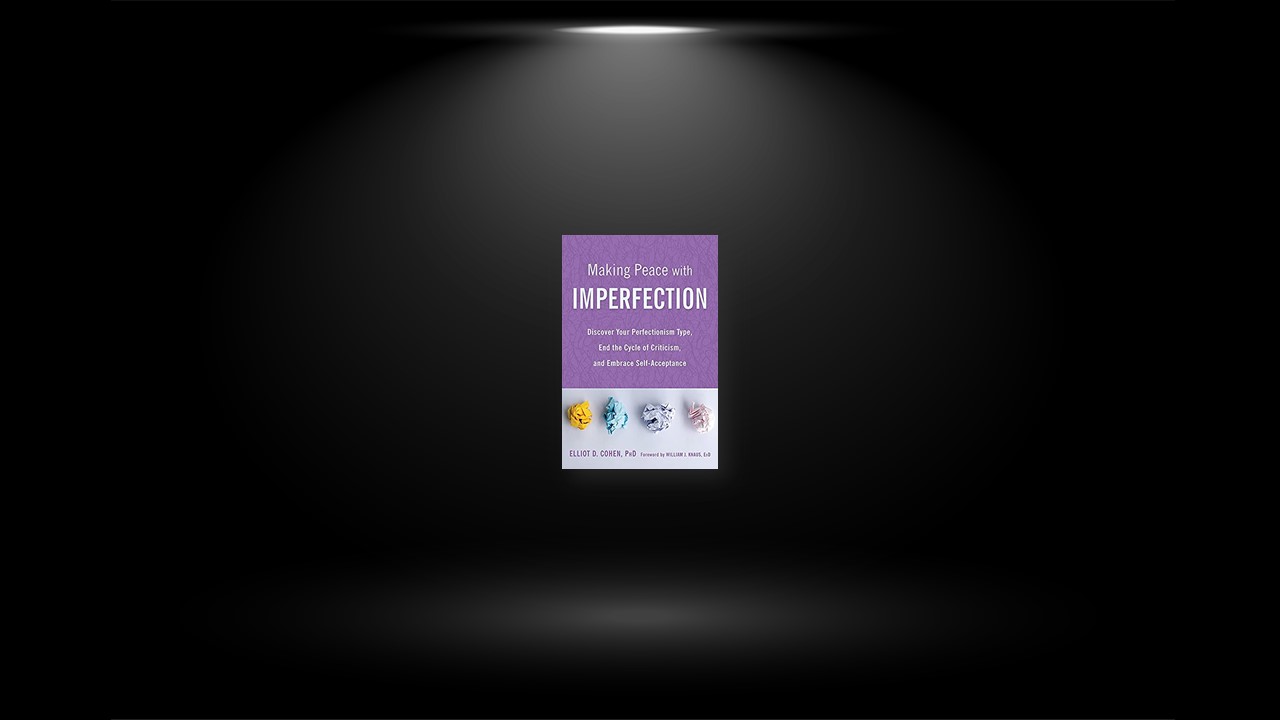Demanding Perfection: What It Is and Why It’s Self-Destructive
This demand has certain features that work together to produce these stressful, self-defeating results. Though you are sincere and committed to doing what is right and good, the logic of your demand can sabotage your efforts. How does demanding perfection in this self-defeating way appear in your life?
Your “Musts” Become Laws
You musturbate about the thing (or things) in question—that is, you think that it must be, thus setting up a pseudo law of nature. For example, you think that bad things must never happen to you or to your loved ones. So, as with the law of gravity and its corollary—“Whatever goes up must come down”—you invent an artificial law stipulating that no serious harm comes to you or your loved ones. Indeed, such things might happen to someone else, but never to you or the ones you love!
Any Alternatives Just “Can’t” Happen
You therefore can’tstipate about it by telling yourself that it can’t be any other way, and you refuse to entertain any other possibilities. “I just can’t settle for anything less than an A on that test!” For you, the world offers no other acceptable options; anything else is unthinkable!
It’s an All-or-Nothing Game
Your demand is therefore absolute, admitting no exceptions. “I must always have the approval of others, or at least the people who are important to me.” “I must never fail at anything, or at least at anything at which I actually try to succeed.” In doggedly applying such an all-or-nothing logic to a variable universe, you foreclose the opportunity to deal rationally with the inevitability of disappointment.
The Journey of Recovery
The author recommends the recovery model of substance addiction for the purposes of easing the grip of your demanding perfection. This means that you are always in the process of getting better and improving, but never cured. You’ll need to accept that you can’t ever let your guard down. If you declare yourself cured, this is the time to be most concerned, because it means that you have lapsed back into a state of demanding perfection—this time about never demanding perfection. “Now that I am cured, I must never demand perfection!” Oh, but it just doesn’t work that way! This is instead a recipe for making yourself anxious about not demanding perfection ever again, and for feeling down when you lapse.
What has gotten you into a perfectionistic habit is not your idealism, but your misplaced idealism. It is indeed exciting to aim for an ideal. Living without ideals to strive for can get boring and self-constraining. When you tell yourself the sky is the limit, you can ignite a passion for forward-moving constructive change. It’s only when you demand that you attain your ideals perfectly that you invariably fall short. So the author hereby offers you a set of ideals to strive for, with the admonition that you will never perfectly realize them.
Respect
This set of guiding virtues can help us overcome self-destructive tendencies to rate reality, including human reality, as utterly worthless or totally crappy when it’s not perfect. Respectful people avoid the irrational tendency to condemn the whole based on the part, and they are open to the inherent goodness in things despite imperfections.
Authenticity
Authentic people are autonomous (self-determining) and live according to their own creative lights. They therefore do not demand the approval of others in trying to validate themselves. Instead, they value their individuality and personal freedom, and do not attempt to hide their responsibility for their decisions by blaming others or making other lame excuses.
Courage
Being courageous means you are disposed to take reasonable risks, without under- or overestimating the danger. This means being afraid (or not afraid) to the extent that it is reasonable, and acting according to the merits of the situation. The courageous person does not demand certainty before acting but also does not take unreasonable risks. Such a person also does not awfulize or catastrophize about how bad something is—turning it into the worst thing, or near-worst thing, or much worse than it really is—and then worry excessively about it.
Self-Control
This set of guiding virtues involves rational control over your actions, emotions, and will. By telling yourself you can’t do otherwise, you can defeat your own purposes. For example, you can keep yourself from advancing by refusing to try. In contrast, a person with self-control can take control of her own life (body, mind, and spirit) by cognitively and behaviorally overcoming such self-defeating can’ts.
Achievement Perfectionism
Achievement perfectionists make absolutist demands on themselves, for example, that they must:
Never, or almost never, make any mistakes, even very small inconsequential ones
Always or almost always meet their goals, or at least certain goals
Always or almost always be the best at everything, or at least at certain things
Always or almost always do flawless, or near flawless, work or deeds
These demands are either impossible or nearly impossible to satisfy in this imperfect world. As such, achievement perfectionists tend to set themselves up for failure and then torment themselves for having failed to meet their self-imposed demands. This can be an incredibly stressful way to live.
Approval Perfectionism
People who are approval perfectionists may:
Experience strong self-doubt when they don’t get the approval of at least certain people
Feel they must be liked, loved, or approved of by everyone (or almost everyone) and experience self-doubts when that doesn’t happen
Go out of their way to make sure others like, love, or approve of them, even to the point of doing things that they think are wrong or that are very inconvenient
Worry for extended periods about not having or getting the approval of others
Moral Perfectionism
Moral perfectionism is a type of self-regarding perfectionism in which you demand that you never, in any way, violate your moral principles. People who are moral perfectionists typically:
Experience intense guilt when they think they have done something morally wrong, even if it’s a very minor moral wrong
Think they are bad when they believe they have—or simply might have—done something morally wrong
Ruminate about their perceived moral wrongdoing, even very minor instances
Experience intense anxiety about making moral choices
Procrastinate about making or acting on hard moral choices
Expectation Perfectionism
Expectation perfectionists demand perfection, or near-perfection, of others in general or certain others with whom they have a relationship, imposing rigid, perfectionistic standards on their children, employees, teachers, students, friends, significant others, service providers, and more. When they think these standards have not been, or may not be, satisfied, their emotional responses tend to be exaggerated, and may include:
Anxiety
Depression
Sadness
Anger, including rage
Shock (as distinct from disappointment or surprise)
The expectations of these perfectionists tend to be:
Unrealistic (impossible or extremely difficult to satisfy)
Unconditional (without or almost without exception)
Grandiose (overly ambitious)
Burdensome (overly imposing on others)
Demanding (others must be perfect or near-perfect)
Ego-Centered Perfectionism
Most of us prefer socializing and working with people who share at least some of our beliefs and values, especially outlooks we think are important, such as our religious or moral values. However, ego-centered perfectionism is not merely a preference; rather, it’s a perfectionistic demand that other people always, or almost always, agree with your points of view, such as your beliefs, values, desires, interests, preferences, or tastes (Cohen, 2015).
Ego-centered perfectionists may:
Get disturbed when other people disagree with them, sometimes even about small things
Express unwillingness to see things from the perspectives of others who don’t share their views
Think that the viewpoints of others who disagree with them are not credible
Think that others who don’t agree with them are stupid, bad, or otherwise not worthy of their company
Think that they always, or almost always, have to be right
Rarely if ever admit that they are wrong


